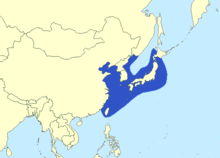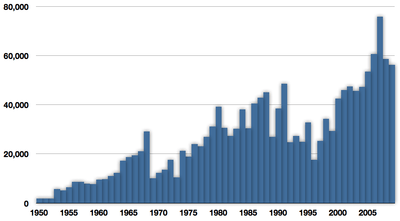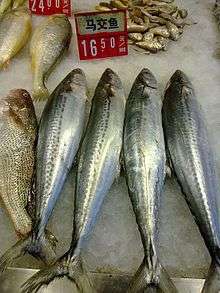Japanese Spanish mackerel
The Japanese Spanish mackerel (Scomberomorus niphonius), also known as the Japanese seerfish, is a species of true mackerel in the scombrid family (Scombridae).[2] Their maximum reported length is 100 cm, and the maximum reported weight is 10.57 kg.[3]
| Japanese Spanish mackerel | |
|---|---|
_-_Kawahara_Keiga_-_1823_-_1829_-_Siebold_Collection_-_pencil_drawing_-_water_colour.jpeg) | |
| Scientific classification | |
| Kingdom: | Animalia |
| Phylum: | Chordata |
| Class: | Actinopterygii |
| Order: | Scombriformes |
| Family: | Scombridae |
| Genus: | Scomberomorus |
| Species: | S. niphonius |
| Binomial name | |
| Scomberomorus niphonius (Cuvier, 1832) | |
 | |
| Synonyms | |
| |
Fisheries
Japanese Spanish mackerel is an important species for fisheries in east Asia. South Korea is the country reporting the biggest annual catches, followed by Japan and Taiwan. These added to a relatively modest total catch of about 56,000 tonnes in 2009. However, China reports very large catches of unidentified seerfish (Scomberomorus spp., fluctuating around 400,000 tonnes in 2000–2009), without reporting catches of any single Scomberomorus species.[4] It is likely that these catches include a significant proportion of Japanese Spanish mackerel.
  Japanese Spanish mackerel on sale in Yuhuan, China |
As food
Japanese Spanish mackerel is often served as sushi, under the Japanese name sawara.
Notes
- Collette, B.; Chang, S.-K.; Di Natale, A.; Fox, W.; Juan Jorda, M.; Nelson, R. & Uozumi, Y. (2011). "Scomberomorus niphonius". IUCN Red List of Threatened Species. 2011: e.T170356A6767322. doi:10.2305/IUCN.UK.2011-2.RLTS.T170356A6767322.en.
- "Scomberomorus niphonius (Cuvier, 1832)". Integrated Taxonomic Information System. Retrieved 9 March 2012.
- "IGFA Records". Archived from the original on February 11, 2016.
- FAO (Food and Agriculture Organization of the United Nations) (2011). Yearbook of fishery and aquaculture statistics 2009. Capture production (PDF). Rome: Food and Agriculture Organization of the United Nations. p. 230.
- Scomberomorus niphonius (Cuvier, 1831) FAO, Species Fact Sheet. Retrieved 2 March 2012.
References
- Collette B; et al. (2011). "Scomberomorus niphonius". IUCN Red List of Threatened Species. 2011. Retrieved 2 March 2012.CS1 maint: ref=harv (link)


